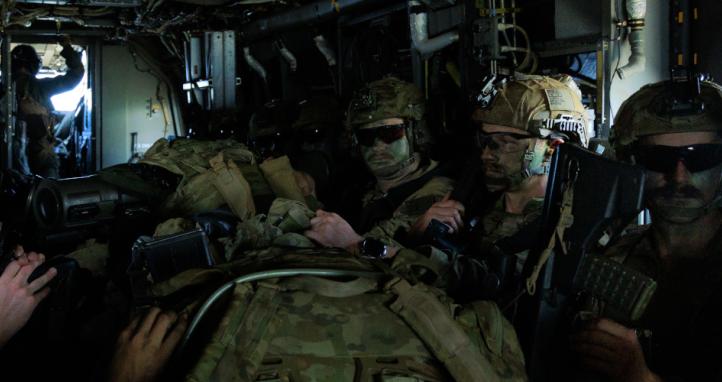For many soldiers, the battlefield represents structure, discipline, and high-pressure decision-making. Yet for some, another battle takes place within, a struggle to understand oneself in a world that demands conformity. This was the case for me. After 20 years of service and at the age of 37, I was diagnosed with autism spectrum disorder and attention deficit hyperactivity disorder (ADHD).
This article reflects on my personal journey with ASD and ADHD while serving in the Australian Army. My intention is to share insights into the challenges and strengths that come with being neurodivergent in a demanding profession. These reflections are based on my own experiences and are offered to help leaders and colleagues better understand how neurodivergence can shape a soldier’s service. It is also important to acknowledge that individuals with ASD and ADHD have diverse experiences, and that my story may not represent the experience of others.
Clarity has only come recently. My diagnosis was made in September of last year, and since then I have been able to look back over my service with a new perspective. While these reflections are informed by only a short period of formal recognition, they draw on a lifetime of experience.
Living with autism and ADHD in uniform
Autism and ADHD affect how people think, learn and interact. Autism can influence social communication, sensory experiences, and responses to change; while ADHD affects attention, focus, and energy levels. Living with both conditions meant that I often approached problems differently, processed information in unique ways, and struggled in situations others took for granted.
The military environment amplified these challenges. Constant changes to routine, unstructured social interactions, and sensory overload often left me drained. At the same time, traits such as deep focus, strong memory, and alternative problem-solving perspectives proved valuable. I thrived in high-pressure environments where instructions were clear and tasks required precision.
The real challenge was not the conditions themselves but the lack of recognition and support. Without understanding or accommodation, I pushed myself to mask my struggles, which eventually led to burnout.
A life shaped by difference
From an early age, I felt different. I excelled in tasks that required intense focus, but I was unsettled by sudden changes and found social situations confusing. Humour became a way to mask my differences.
When I enlisted in the Australian Regular Army in 2005 at the age of 17, the clear routines and discipline initially suited me. Yet the constant demands of service took a toll. My intense focus was sometimes mistaken for stubbornness, and my difficulty with small talk for aloofness. I was respected for my dedication, but internally, I was exhausted from the effort of appearing ‘normal’.
For years, I explained my struggles by assuming I was not smart enough. I would break down information piece by piece, often taking far longer than others to process it. This, combined with the pressure of career courses and constant self-doubt, fed stress and anxiety.
The diagnosis that changed everything
After years of unexplained fatigue and anxiety, I underwent diagnostic testing. My decision to seek help was prompted by my son’s own diagnosis of autism, which made me recognise the signs in myself. The result confirmed autism, and further evaluation revealed ADHD. Receiving these diagnoses was both a revelation and a relief. For the first time, I had an explanation for my experiences. My struggles were not personal failures but characteristics of a neurodivergent mind.
I began managing my ADHD with prescribed medication, which improved my focus without side effects. This proved crucial during a demanding posting to a brigade headquarters in 2025, when I had to cover multiple roles due to staff shortages. The ability to maintain focus and manage competing priorities reinforced my decision to seek a diagnosis and support.
Equally important, I began to recognise my strengths. Attention to detail, problem-solving ability, and deep focus were not quirks or oddities. They were valuable traits that, when understood, could benefit my work and my organisation.
Redefining success and supporting others
With this new understanding, I now advocate for improved awareness and support for neurodiverse soldiers in the Australian Defence Force (ADF). I share my experiences with colleagues in the hope that others who are struggling in silence will recognise themselves and seek support.
The ADF has made progress in recognising and supporting neurodivergent members, but there is still more to be done. Policies that allow access to medication, therapy, and tailored adjustments are a positive step. The next step is cultural. Leaders must build an understanding of the strengths that neurodivergent soldiers bring and ensure they are not overlooked or pushed to their breaking point.
Neurodiversity is not a weakness to be managed. It is a strength to be understood, supported, and harnessed.
Towards a more inclusive ADF
My story is not unique. Many people spend years undiagnosed, navigating life without knowing why they face particular challenges. For soldiers, the stakes are even higher. The military demands excellence, resilience, and adaptability. Without recognition of neurodivergence, talented individuals risk burning out before their potential is realised.
The ADF is stronger when it values different ways of thinking. With the proper support, neurodivergent soldiers can thrive, bringing skills and perspectives that enhance capability.
My late diagnosis is not the end of my journey, but the beginning of a new chapter. By sharing my experience, I hope to encourage others to seek understanding, embrace their strengths and help shift perceptions of what it means to be a capable soldier.










It's curious that the ADF still treats ADHD as "other" when (once you have a diagnosis) you can often start to recognise it as being all around you in Defence.
Thank you immensely.
This psychologist then told my daughter, “ she couldn’t tell that my daughter was autistic!”. After delayed communication, the DMO (temporary contract and bot familiar with discrimination history not privy to to the fact various ADF personnel were excited to have my daughter join reservist yes RESERVISTS suggested due to
my daughters “autism condition” the position of singer wasn't suitable. My daughter sings stadium level, produces & leads multiple teams & the ADF required a female singer who was non pitchy & in tune … Listen to recent performances there is a standard & my daughter according sports entertainment, ANZAC DAY, has the ability to change genres due to opera training Recruits and the ADF have breached inclusion, values, conduct & ignored recruit superpower statements pertaining to inviting ASD applicants. This is in appeal mode with senior officials expecting her to be enlisted in absolute shock…. recruits have dragged it out over 18 months. My daughter was requested to obtain expensive medical psychological assessments that stated she was fit and able supported by opera & community leader referees. They asked for the paediatrician who diagnosed her ASD at 4 years old unfortunately he is dead but other specialists recommended her as an asset! This needs to be flagged!